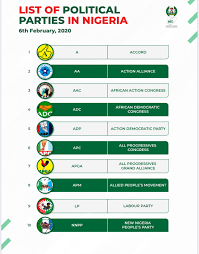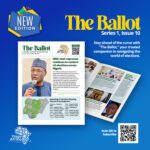*By David Mkpume
Democracy as the cornerstone of modern governance thrives on the strength of its institutions, which includes political parties as they play a pivotal role in shaping the democratic landscape, and in the functioning and sustenance of democracy. They also serve as the organizational framework through which citizens express their political preferences by bringing together people with the same political ideology to compete for public office, and influence policy decisions.
By providing a structured way for citizens to organize around shared values, parties are able to ensure that a wide range of views is represented in the political arena. Thus, the ownership of political parties should not be seen as a one-man affair; everybody should be given equal opportunities. It is equally important that parties adhere to established rules and procedures guiding the party as this ensures that they are not weakened internally through the litigation of cases arising from their activities such as party primaries and elections of party leadership.
As such, the need to strengthen political parties is not merely a matter of organizational development but a crucial prerequisite for sustaining the democracy of a nation. The significance of political parties goes beyond the mere function of contesting and capturing or retaining political power – it is vital to our democracy’s survival as military governments do not recognize political parties as a platform to contest elections and form new governments.
However, Nigeria’s political parties have not lived up to expectations as democratic institutions: they regularly flout their own constitutions and rules, they do not have ideologies that set them apart from others, and far too often, their primaries are so riddled with irregularities that it is the courts that often decide the winners when it should be the members.
Accountability and transparency are integral qualities that contribute to the overall health, effectiveness, and legitimacy of a political party. A party that embraces these principles not only strengthens its internal cohesion but also enhances its standing in the eyes of the public, reinforcing the democratic foundations on which it operates, playing a central role in shaping policies, fostering civic engagement, and ensuring the effective functioning of the political system.
This means that the process of selecting candidates and party leadership should be transparent and inclusive, as this will reduce the likelihood of the court deciding the party’s leadership or its candidates in elections. The fate of who emerges as party candidates and leadership should be decided by party members and not the court. This can help prevent conflicts within the party that might spill over into legal challenges.
Another important function of political parties is their ability to effectively translate their policy platform into actionable measures once in office, as this shows their readiness to serve the people. It is also important that opposition parties should serve as a watchdog that will scrutinize the actions of the ruling party, holding them accountable for their decisions and providing an alternative vision for governance.
Lastly, parties should engage in and provide avenues for public discourse and debates that elevate the level of discussions in the society on tackling governance issues. They should also carry out campaigns that enhance political literacy among citizens, increasing the capacity of these citizens to make the right choices at the ballot box. Importantly, they should also invest in the capacity development of party members’ skills and capabilities.
A party that prioritizes capacity building will foster a cadre of competent leaders and policymakers that will enhance its ability to implement effective and well-informed policies. If its members are skilled in the various aspects of governance and policy making, the party will remain connected to the interests and concerns of its constituents. Regular engagement with the public through town halls, surveys, and other feedback mechanisms ensures that the party’s policies align with the needs of the people it aims to represent.
David Mkpume is a Communications Officer at Yiaga Africa with experience in election observation and political inclusion advocacy in Nigeria. This article was first published in the Vanguard Newspapers here.




